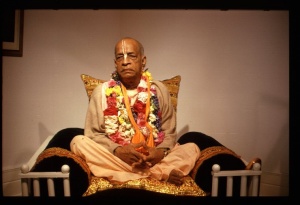SB 1.3.42 (1962)

A.C. Bhaktivedanta Swami Prabhupada
TEXT No. 42
Sa tu samshrvayamasa maharajam Parikshitam Prayopavistam gangayam paritam paramarsivish
ENGLISH SYNONYMS
Sa—the son of Vyasdeva, Tu—again, Samshrvayamasha—made them audible, Maharajam—unto the Emperor, Parikshita—of the name, Prayopavistam—who sat until death without any food and drink, Gangayam—on the bank of Ganges, Paritam—being surrounded by, Paramarsivih—by great sages.
TRANSLATION
Sukhdeva Goswami the son of Vyasdeva in His turn made Bhagwatam heard by the great Emperor Parikshit who sat tight on the bank of the Ganges until death without any food and drink and surrounded by great sages.
PURPORT
All transcendental messages are received properly in the chain of disciplic succession. This disciplic succession is called Parampara. Unless therefore Bhagwatam or any other Vedic literatures are received through such Parampara system, the reception of knowledge is not bonafide. Vyasadeva delivered to Sukadeva Goswami, and from Sukadeva Goswami Suta Goswami received the message. One should therefore receive the message of Bhagwatam from Suta Goswami or from his representative and not from any irrelevant interpreter.
Emperor Parikshit received the information of his death timely and he at once left his kingdom and family and sat down tight on the bank of the Ganges completely in fasting till death. All great sages rishis, philosphers, mystics etc. reached there on account of His imperial position. There were many suggestions about his immediate duty and at last it was settled that he would hear from Sukhdeva Goswami about Lord Krishna and thus the Bhagwatam was spoken to him.
Sripada Shankaracharya who preached Mayavada philosophy stressing on the impersonal feature of the Absolute,—did also at last recommend that one must take the shelter of the lotus feet of Lord Sri Krishna without any hope of gain from debating society. Indirectly Sripad Sankaracharya admitted that what he had preached in the flowery grammatical interpretations of the Vedanta sutra, cannot help one seriously at the time of death. At the critical hour of death one must recite the name of Govinda is the recommendation of all great transcendentalists. Sukadeva Goswami had long stated the same truth that at the end one must remember Narayana and that is the essence of all spiritual activities. In pursuance of this eternal truth Srimad Bhagwatam was heard by the emperor Parikshit, and it was recited by equally able recitor Sukadeva Goswami. And both the speaker and the receiver of the messages of Bhagwatam, were duly delivered by the same one medium.